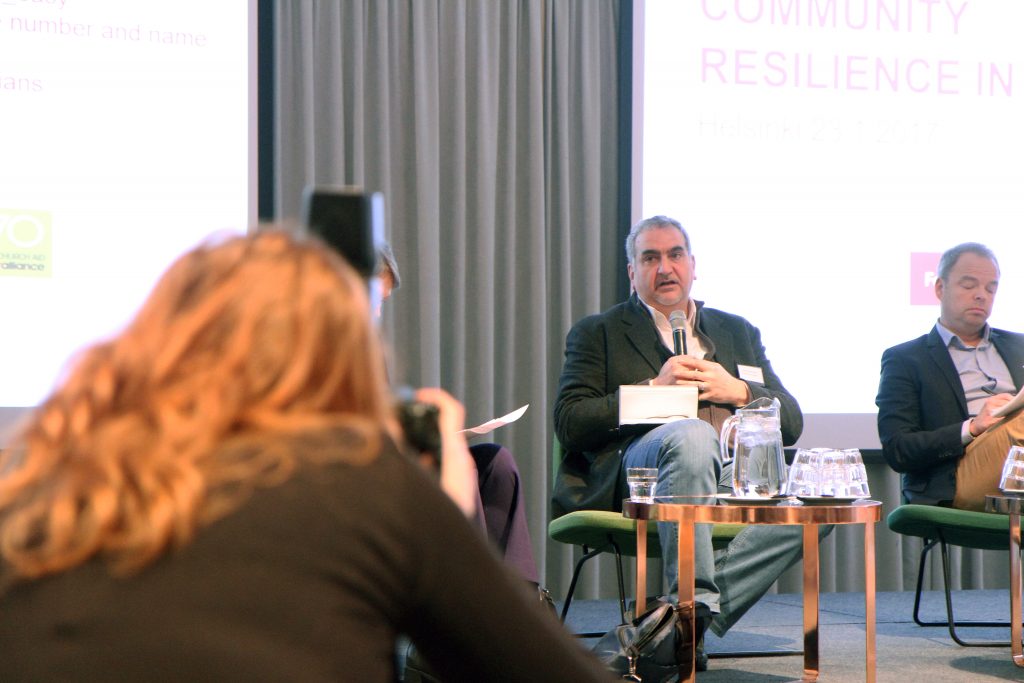“In Syria, we need reconciliation in every community”
Supporting Syrians’ own plans is central to any effective aid delivery. This was the key message at a seminar organized by CMI and six other Finnish non-governmental organizations.

According to Omar Abudulaziz Hallaj, an expert on peace building and recovery planning in Syria, the international community should direct its efforts to building bridges between different communities on a local level.
In war-torn Syria, everything possible should be done to promote reconciliation at grass-root level. Supporting Syrians’ own plans is central to any effective aid delivery, whether it’s about basic services or trust-building between communities.
These were the key messages at a seminar jointly organized by CMI and six other Finnish non-governmental organizations (NGO) in Helsinki on Monday. The seminar was attended by several Syrian civil society activists and non-governmental organizations working in the country.
The seminar, How to support bottom-up community resilience in Syria, aimed at giving recommendations to the international Syria conference held in Helsinki this Tuesday. The seminar highlighted the urgency of changing the approach as the Syrian war is about to enter its seventh year. The United Nations is expected to release new plans on its aid work in Syria at the Tuesday conference.
According to Omar Abudulaziz Hallaj, an expert on peace building and recovery planning in Syria, the international community should direct its efforts to building bridges between different communities on a local level.
“There’s a lot of reconciliation work that needs to be done. We need to look at reconciliation in every community, not just between government and opposition. Brothers are at arms with each other. Neighbors are at arms with each other”, said Hallaj, who currently works as a co-coordinator of the Syria Project at the Common Space Initiative.
Hallaj said that the international community and the Syrian civil society need to have a common vision on how the reconciliation work is done across different communities. Hallaj highlighted the fact that the most important reconciliation work done in Syria is done by women on national and local level.
“This is something we should capitalize on.”
“All aid processes should strive for the same goal: sustainable and inclusive peace in Syria”
Syrian civil society activist Eva Zidan emphasized the various divisions the war has created. The war media incites people to reject each other, Zidan said. At times, she added, the UN and international non-governmental organizations amplify these divisions by delivering aid to only one type of area, whether it’s government- or opposition-controlled.
“If we really want to build bottom-up resilience to the crisis, we need to strengthen social cohesion among Syrians. There is a need for common spaces where all Syrians can work together, regardless of what groups they belong to”, said Zidan, who works as a coordinator at the civil society organisation COSV.
The UN Development Programme (UNDP) Administrator, Helen Clark, admitted that the civil society needs to play a greater role so that Syrians themselves can respond more effectively to the crises. Closer links are needed between the UN and local non-governmental organisations, Clark said.
In her concluding remarks, Kristiina Rintakoski, Director of Peacebuilding and Advocacy at the Finnish NGO Felm, said that addressing the underlying drivers of conflict is the only way to bring change in the long run.
“Therefore, all aid processes should strive for the same goal: sustainable and inclusive peace in Syria.”